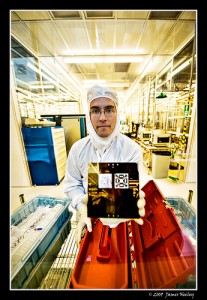Computers have speed limit as unbreakable as speed of light, say physicists

A pair of physicists have shown that if processors continue to accelerate in accordance to Moore's Law, we'll hit the wall of faster processing in roughly 75 years.
The curtain will eventually come down for silicon in today's manufacturing methods once engineers can no longer further shrink transistors and the copper wires that connect them. Processor fabrication using new technologies such as imprint lithography, graphene, and quantum computing will continue to yield faster and smaller chips. Nonetheless, those advanced techniques only stave off the absolute ceiling for speed, no matter how small the components get, according to professors Lev Levitin and Tommaso Toffoli at Boston University's Department of Electrical & Computer Engineering. As Inside Science reports, the two have slapped a speed limit on computing.

A UCSB researcher holds a mask that will be used in building a 4 qbit chip (Credit: James Neeley via Flickr)
In a recently published paper in the journal Physical Review Letters, Levitin and Toffoli present an equation for the minimum sliver of time it takes for a single computation to occur and establishes the speed limit for all possible computers.
Using their equation, Levitin and Toffoli calculated that, for every unit of energy, a perfect quantum computer spits out ten quadrillion more operations each second than today's fastest processors, according to Inside Science.
"If we believe in Moore's law ... then it would take about 75 to 80 years to achieve this quantum limit," Levitin said. ??"No system can overcome that limit. It doesn't depend on the physical nature of the system or how it's implemented, what algorithm you use for computation … any choice of hardware and software. This bound poses an absolute law of nature, just like the speed of light."
The physicists point out that technological barriers might slow down Moore's law as we approach this limit.
Scott Aaronson, a pioneer in quantum computing and assistant professor of electrical engineering and computer science at MIT believes that the forecast for 75 years is optimistic.?? Moore's Law, he said, probably won't hold for more than 20 years. ??That may be so, but predictions made over the last few decades about the death of Moore's Law have been wrong.
Here's another quote from Aaronson: ??"From a theorist's perspective, it's good to know that fundamental limits are there, sort of an absolute ceiling. You may say it's disappointing that we can't build infinitely fast computers, but as a picture of the world, if you have a theory of physics allows for ?infinitely fast computation, there could be a problem with that theory."
In your view, how much longer till the demise of Moore's Law? Post in Talkback.